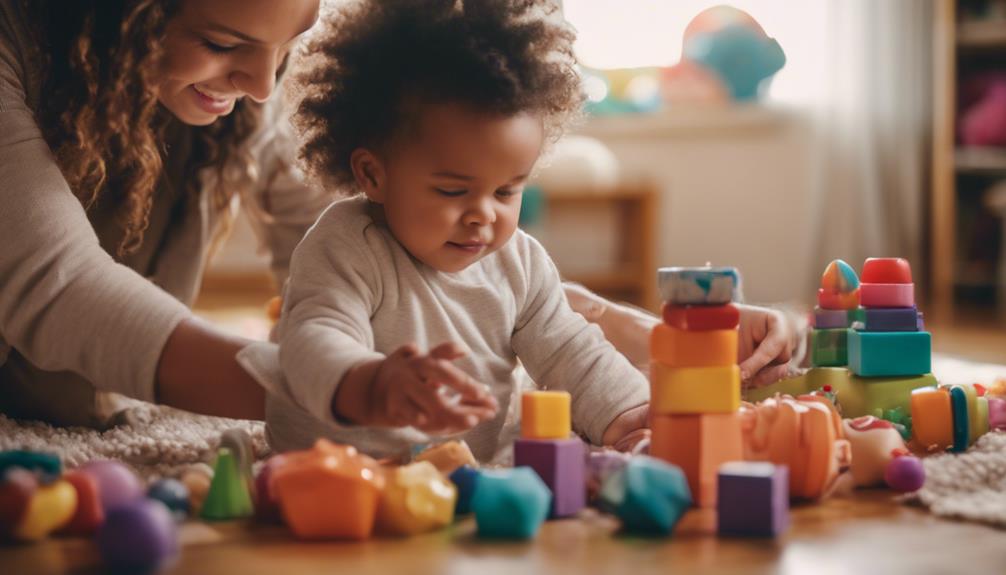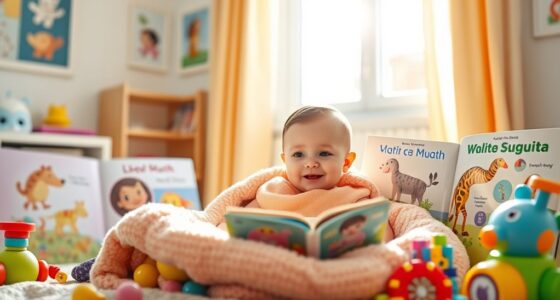In order to improve communication skills in early childhood, it is important to focus on active listening techniques such as reflective listening to effectively validate feelings and thoughts. Showing respect towards children through maintaining eye contact and building trust is crucial. Establishing trust with families requires open communication and cultural sensitivity. Educator workshops provide interactive strategies and role-playing activities to enhance communication skills. Utilizing technology and being adaptable to diverse cultural backgrounds can improve communication effectiveness. Implementing these strategies is crucial for overall development and future success. To learn more about nurturing strong communication skills in early childhood, further insights can be found by clicking here.
Key Takeaways
- Encourage active listening to understand children's perspectives.
- Use reflective listening techniques to validate feelings and thoughts.
- Provide a safe, judgment-free space for children to express themselves.
- Foster empathy through verbal and nonverbal cues during interactions.
- Utilize role-playing activities to practice and enhance communication skills.
Importance of Early Communication Skills
Developing strong communication skills in early childhood is essential for laying the groundwork for future success in both academics and social interactions. In early childhood, children begin to acquire and hone their verbal and nonverbal communication abilities, which play a vital role in their overall development. Through communication skills, young individuals learn to express their thoughts, feelings, and needs effectively, setting the stage for positive interactions with others.
Verbal communication skills enable children to articulate their ideas and engage in meaningful conversations, while nonverbal communication, such as body language and facial expressions, helps convey emotions and understand social cues. Mastering both forms of communication in early childhood not only boosts confidence and self-expression but also fosters strong relationships with peers and adults.
Moreover, early language development is closely linked to enhanced cognitive abilities and problem-solving skills, highlighting the importance of encouraging communication from a young age. By nurturing these skills in early childhood, parents and educators can support children in their journey towards lifelong learning and effective communication.
Active Listening Techniques

Active listening techniques are essential in fostering effective communication skills.
By utilizing reflective listening benefits, you can show understanding and empathy towards the speaker.
Building empathy through active listening creates a supportive environment for open and honest conversations.
Reflective Listening Benefits
When engaging in conversations with young children, employing reflective listening techniques can greatly enhance communication effectiveness. Reflective listening, a form of active listening, involves paraphrasing and repeating back what the speaker said to show understanding. This technique not only validates the speaker's feelings and thoughts but also promotes a deeper connection and builds trust in the conversation.
By encouraging the speaker to elaborate on their thoughts, reflective listening leads to more meaningful and productive discussions. It fosters empathy and understanding by accurately reflecting the speaker's emotions and perspectives. Through mirroring the speaker's words, reflective listening enhances communication by ensuring messages are received and interpreted correctly.
This approach is particularly beneficial in early childhood as it helps in developing expressive language skills, fostering a supportive environment for children to communicate effectively and feel understood. By incorporating reflective listening into interactions with young children, caregivers and educators can facilitate their language development and strengthen the foundation for future communication skills.
Building Empathy Through Listening
Employing active listening techniques is key to building empathy in your interactions with young children. When you actively listen, you show genuine interest in what the child is saying, fostering a sense of empathy and understanding.
Through verbal acknowledgments like nodding and using phrases such as 'I see,' you signal your engagement in the conversation. Non-verbal cues like maintaining eye contact and open body language further demonstrate your commitment to listening attentively.
Reflective listening, where you mirror or rephrase what the child expresses, helps them feel validated and heard. By practicing active listening, you not only enhance your communication skills but also deepen your connection with the child.
This approach cultivates empathy by allowing you to truly comprehend the child's perspective and emotions. Ultimately, building empathy through active listening lays a strong foundation for effective communication and nurturing relationships with young children.
Respectful Interactions With Children

Respectful interactions with children involve actively listening to them and acknowledging their thoughts and feelings. When engaging in child care, remember to maintain eye contact, use a calm tone, and show genuine interest in what they're expressing.
Here are three key ways to guarantee respectful interactions with children:
- Validate Emotions: It's essential to provide positive reinforcement and validate children's perspectives. By acknowledging their emotions and experiences, you're setting a positive example of empathy and understanding.
- Encourage Expression: Create a safe space for children to express their emotions freely without judgment. Encouraging open communication helps them develop emotional intelligence and strengthens the bond between you and the child.
- Foster Trust Through Communication: Building a respectful communication environment nurtures trust and confidence in children. When they feel valued and heard, they're more likely to engage in meaningful interactions and develop strong communication skills.
Building Trust With Families

Establishing trust with families in early childhood settings is essential for fostering positive relationships and supporting children's holistic development. Building trust with families in childcare involves creating open, transparent communication channels that allow for mutual understanding and collaboration.
By actively engaging with parents, you can help your child feel supported and valued in their learning journey. Respect for cultural backgrounds and prompt resolution of concerns are key factors in building trust with families.
Effective communication not only reduces misunderstandings and conflicts but also leads to increased parental involvement and satisfaction. By maintaining clear feedback mechanisms and being flexible in your approaches, you can strengthen the bond with families and create a supportive environment for your child's growth.
Investing in building trust with families not only benefits your child but also contributes to a harmonious and collaborative early childhood setting that nurtures every child's development.
Workshops for Educators
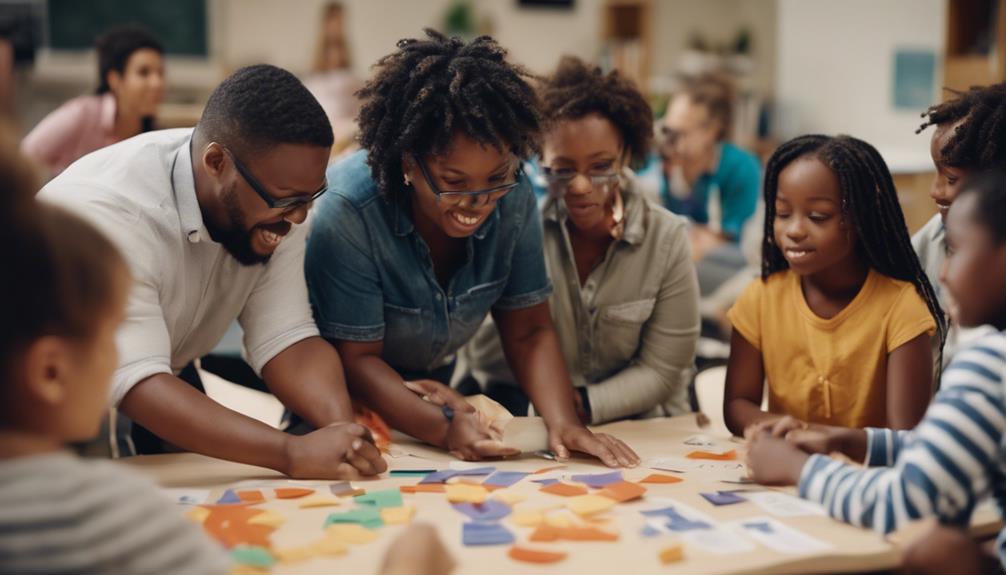
Educators participating in communication workshops are exposed to a range of interactive learning strategies, such as role-playing activities and collaborative language games. These hands-on approaches allow educators to practice and refine their communication skills in a supportive environment.
Interactive Learning Strategies
During interactive learning workshops, educators engage in activities aimed at enhancing their communication skills in childcare settings.
Here are three key strategies to improve interaction with children:
- Teach your child:
Educators learn effective techniques to impart knowledge in ways that engage children and enhance their learning experience. By understanding how to present information clearly and in a child-friendly manner, educators can foster a positive and enriching educational environment.
- Take turns:
Educators practice taking turns during activities to model patience and respect, which are essential skills for effective communication with children. By demonstrating turn-taking behavior, educators can encourage children to engage in reciprocal conversations and interactions.
- Share with others:
Educators are encouraged to share their experiences and insights with colleagues to promote collaboration and the exchange of best practices. By sharing strategies that have been successful in their own childcare settings, educators can learn from each other and continuously improve their communication skills.
Role-Playing Activities
Engage in role-playing activities during workshops to enhance your communication skills with children in early childhood settings. These sessions provide educators with a valuable opportunity to practice and refine their communication techniques through simulated scenarios.
By participating in role-playing activities, educators can develop a deeper understanding of how to interact effectively with young learners. Workshops focus on honing essential communication strategies like active listening and clear articulation, vital for fostering positive connections with children.
Through these exercises, educators learn to adapt their language and communication styles to suit the needs and comprehension levels of their students, promoting better engagement and understanding. Role-playing workshops offer a hands-on approach for educators to fine-tune their skills and establish rapport with children in a practical setting.
Collaborative Language Games
To further enhance your communication skills in early childhood settings, explore the value of collaborative language games in workshops for educators. These workshops provide a platform for interactive activities that foster language development and social interaction among children.
Here's why collaborative language games are beneficial:
- Enhanced Communication Skills: By engaging in collaborative language games, educators can learn how to effectively communicate with young learners, helping them express themselves more confidently.
- Language Development: The interactive nature of these games promotes vocabulary expansion, sentence structure development, and overall language proficiency in children.
- Interactive Activities: Through workshops, educators gain insight into implementing fun and engaging language games that encourage participation and active learning, creating a dynamic environment for language development.
Training Programs for Childcare Providers
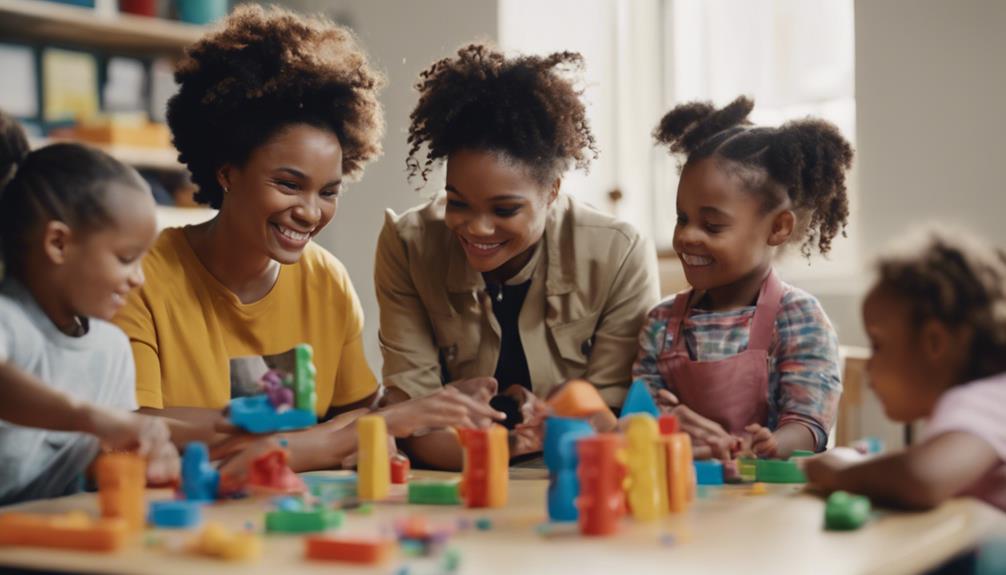
Childcare providers can enhance their communication skills through specialized training programs. These programs offer a range of benefits, including improved interactions with children and parents, enhanced strategies for effective communication, and the development of essential interpersonal skills tailored to childcare settings. Online courses provide flexible learning options, allowing childcare professionals to upgrade their communication techniques at their convenience. Certificate programs focus on honing communication skills essential for engaging effectively with children in childcare environments. Guest experts often lead workshops and courses, contributing to continuous professional development and fostering collaboration among childcare providers. By improving both verbal and non-verbal communication skills, childcare providers can positively impact children's development and strengthen their relationships with caregivers. Below is a table summarizing the key aspects of training programs for childcare providers:
| Training Programs for Childcare Providers | Benefits |
|---|---|
| Communication Workshops | Enhanced skills and experiences |
| Online Courses | Flexible learning options |
| Certificate Programs | Tailored communication skills |
Utilizing Technology in Communication
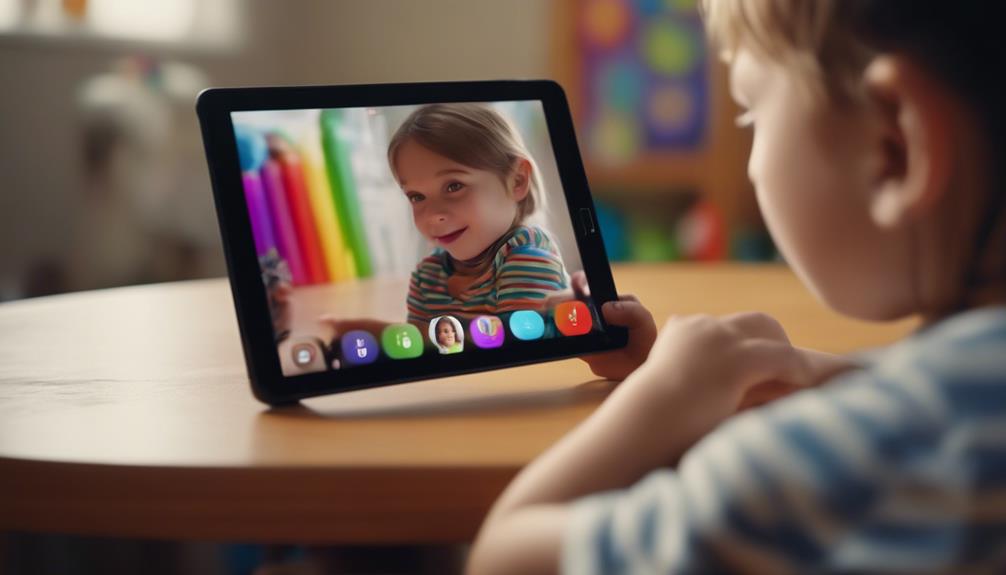
Technology plays a crucial role in enhancing communication within childcare settings by providing innovative tools and platforms for streamlined interactions. Utilizing technology in communication offers numerous benefits:
- Customized Communication Styles:
Technology allows childcare providers to adapt their communication styles based on parent preferences and chosen methods. This customization guarantees effective and personalized interactions.
- Establishing Efficient Communication Channels:
Through technology, childcare centers can establish efficient communication channels to keep parents informed and engaged. Tools like LifeCubby enable real-time information sharing, feedback lines, and open-door hours, enhancing the overall communication process.
- Enhancing Emergency Response Plans:
Technology aids in updating emergency response plans with effective communication strategies. By leveraging technology, childcare centers can ensure quick and clear communication during emergencies, enhancing the safety and security of children in their care.
Incorporating technology in communication not only improves efficiency but also strengthens the connection between childcare providers and parents, fostering a collaborative and supportive environment.
Adapting to Diverse Cultural Backgrounds

Understanding and adapting to diverse cultural backgrounds is fundamental in fostering effective communication in early childhood settings. By acknowledging the significance of cultural backgrounds, you can tailor communication styles to meet the varied needs of families.
Adapting your communication approaches based on cultural preferences not only demonstrates respect but also builds trust with families from different backgrounds.
Recognizing and honoring various traditions and values enriches the communication experience in early childhood environments, creating a more inclusive and supportive atmosphere.
Providing multilingual resources and interpreters further enhances communication with families who speak different languages, ensuring that all individuals can actively participate and engage in the learning process.
Culturally competent communication promotes inclusivity, understanding, and positive relationships within early childhood settings, paving the way for a collaborative and harmonious environment where both children and families feel valued and respected.
Benefits of Strong Communication Skills
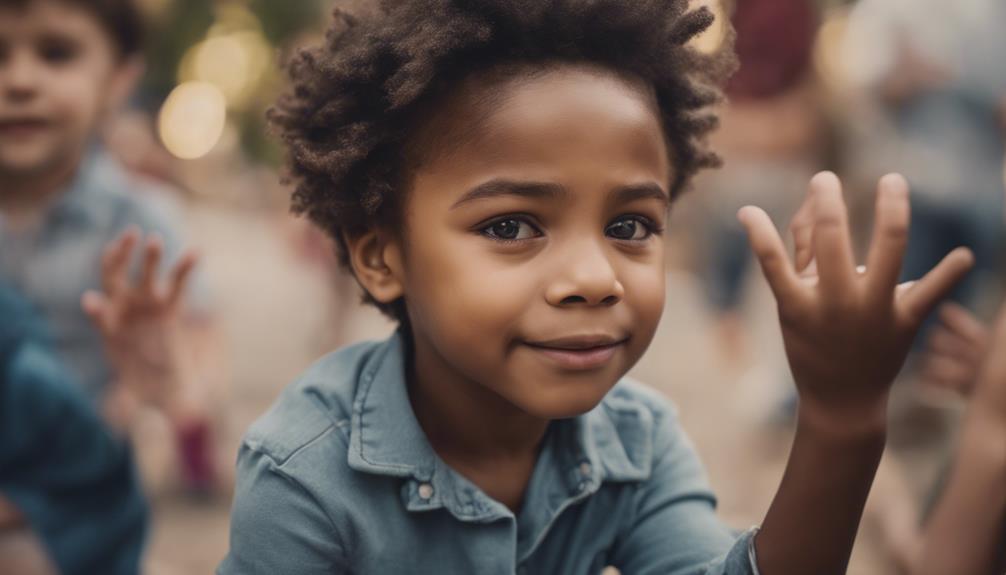
Enhancing communication skills early in childhood empowers individuals to excel academically, develop strong social connections, and nurture emotional well-being. Strong communication skills, particularly in speech and language development, play an essential role in a child's overall development.
Here are three key benefits of honing these skills:
- Improving Academic Performance: Advanced communication skills help children express themselves clearly, leading to better comprehension and articulation of ideas. This clarity aids in effective learning, participation in class discussions, and overall academic achievement.
- Enhancing Social Relationships: Effective communication helps children communicate with others, fostering positive interactions, empathy, and understanding. This ability to convey thoughts and feelings promotes strong social bonds, boosts confidence, and encourages healthy relationships with peers and adults.
- Nurturing Emotional Well-being: Developing strong communication skills early on allows children to express their emotions and needs effectively. This skill promotes self-awareness, emotional regulation, and resilience, contributing to overall mental well-being and a positive self-concept.
Frequently Asked Questions
What Are 5 Strategies That Can Be Used to Facilitate Effective Communication With Children?
Engage actively by listening and using verbal/non-verbal cues. Ask open-ended questions. Speak clearly and at their level. Encourage opinions and emotions. Create a communication-rich environment. These strategies foster effective communication with children, nurturing their skills and emotional intelligence.
How Can Good Communication Skills Help You as an Early Childhood Educator?
Good communication skills help you as an early childhood educator by fostering positive relationships, conveying information effectively, creating a supportive learning environment, addressing concerns, providing feedback, collaborating with others, managing classrooms, guiding behavior, and building a sense of community.
What Are the Examples of Communication Development in Early Childhood?
Imagine observing a child's first babbling turning into clear words, sentences, and stories. These milestones mark communication development in early childhood. From basic speech to complex language, phonological awareness, and literacy skills, children grow remarkably.
What Are 5 Good Communication Skills?
When looking to boost communication skills, focus on active listening, clear expression, nonverbal cues, open-ended questions, and empathy. These skills enhance understanding, promote dialogue, and strengthen relationships. Practice incorporating them into your interactions for effective communication.
Conclusion
To sum up, boosting communication skills in early childhood is like planting seeds in a garden. By actively listening, respecting children, and building trust with families, educators can cultivate a strong foundation for future growth.
Utilizing workshops, training programs, and technology can nurture these skills even further. Adapting to diverse cultural backgrounds guarantees a well-rounded approach.
The benefits of effective communication in early childhood are plentiful, setting the stage for success in the future.


